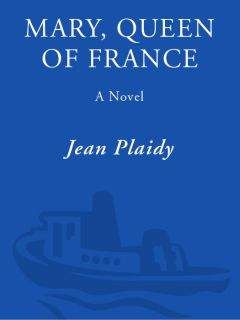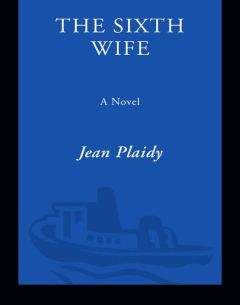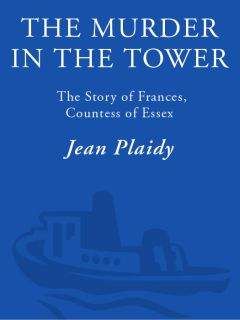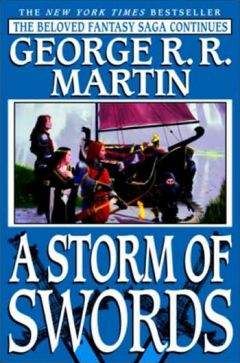“On whose orders?”
“From one who must not be disobeyed.”
“You mean . . . the King?”
“I did not say that. I have orders to take you back to England. . . . I was not told whether you were to be alive or dead . . . only to bring you at any cost.”
“Let me go back to the castle. Let me make ready to leave.”
Lovell shook his head. “The castle is to surrender. You will send a message to your son.”
He signed to two strong men who came forward at once and seized Tyrrell.
“Are you prepared to sign that order? The sea is rough today. Accoutred as you are you would have little chance of surviving.”
They really mean it, thought Tyrrell. What is behind all this? Why did not the King send me a simple command to return? I should have done so. I have nothing to fear from him. Or . . . have I? No, he could not. He would not dare. What I could tell . . .
He was seized with a fit of shivering. He seemed to see Henry Tudor’s cold eyes staring at him.
He said: “I will sign the order for the surrender of the castle. Only my signature will satisfy my son.”
Lovell smiled and bowed his head.
He summoned a messenger. “Take this order at once to the castle. Thomas Tyrrell and John Dighton are to join us here on the ship without delay.”
“My son knows nothing of . . . of anything you may be accusing me of.”
“We have our orders,” smiled Lovell. “And we intend to obey them to the letter.”
In a very short time Thomas Tyrrell and John Dighton joined Sir James on the ship.
Before he reached England Tyrrell knew that he had been a fool to leave the castle. If he had not done so he would be there now . . . defending it against the Calais garrison. He had been tricked. He should never have obeyed the summons to see Lovell. And now what? He knew he was going to be accused with Suffolk. He had committed no treason. It was true that Suffolk had visited him but they had not even talked of treason. If he had a fair trial he could prove this. Suffolk would exonerate him for Suffolk was a man of honor even though he was impulsive and hotheaded.
We shall be all right, thought Tyrrell. We must for we have done nothing.
His great concern was for his son Thomas. Thomas was completely innocent. It was wicked to have dragged him into this. Whatever happened, Thomas must not be made to suffer.
It was spring but there was a chill in the air. He was closely guarded and with him Thomas and John Dighton. They were taken to London and when he saw the great gray edifice ahead of him and realized that it was to be his destination he was filled with cold horror.
He was the King’s prisoner. What could they prove against him? Nothing. He deluded himself. The King’s men could always prove what they wanted to and something told him that there was more in this accusation than he had at first thought.
He was right. The trial had been quick. They had judged him, and with Thomas and Dighton he had been found guilty. The case was that Suffolk had sought aid to come against the King, he had received certain monies, he had planned rebellion, and Sir James Tyrrell had been his accomplice.
Where was Suffolk? He heard that he had been arrested and accused at Paul’s Cross as a traitor with William de la Pole and William Courtenay. They were in confinement somewhere. He did not know where.
But he, Tyrrell, had been condemned to death. It was strange that Suffolk and his accomplices had not been sentenced, yet James Tyrrell who had played no part in the rebellion and whose only sin was that he had received an old friend who called on him, should be condemned to death.
The next day he was to be taken out to Tower Green and there he would suffer the fate of traitors. He should be grateful that it was to be the axe and not that worse fate which was reserved for some.
It was dusk when the door of his cell was opened. No word was said but a figure heavily cloaked came into his cell and stood watching him.
The door of the cell was shut behind him and the two of them were alone.
A shiver ran down Tyrrell’s spine. He thought it was the angel of death already come for him.
Then a voice said: “James Tyrrell, you are to die tomorrow.”
“Who are you?” he asked.
“No matter. You are to die and your son with you.”
“I am innocent of what I am accused. I may have committed crimes in my life but I had no part in Suffolk’s plan. As for my son he is completely innocent of anything that could be brought against him. He is wrongfully accused. . . .”
“He will meet his death tomorrow . . . unless you save him.”
“Save him. How?”
“It is not impossible.”
“Have you come to help him?”
“I will make a bargain with you. You can save your son’s life.”
“How? How?”
“It is easy. You cannot save your own life. That would be too difficult to achieve but you can save your son’s.”
“Only a pardon from the King could do that.”
“I could get that pardon.”
“Who are you?”
“Shall we say that I come from one who can pardon your son.”
Tyrrell was silent. His heart was beating wildly. It could not be . . . But perhaps it was.
“What . . . what should I have to do?”
“To confess to something . . . something that happened a few years ago.”
Tyrrell was silent. He felt his hair beginning to rise on his scalp; it seemed to him that the walls of his cell were closing in on him. Whenever he passed this place he had felt uneasy and it was ever since . . .
But that was long ago. That was another man’s crime. Could he be blamed for seeing that it was carried out? He had had to do so. So much depended on it . . . his future . . . his family . . . his beloved son . . .
“What is wanted is a confession from you, James Tyrrell.”
“What . . . must I confess?”
“You know, do you not? Cast your mind back . . . Remember Dighton . . . Miles Forrest . . . remember that night . . . two little boys . . . innocent young boys whose existence could have started a civil war. They had to go. You realized that. You helped them to it, Tyrrell. What you have to do is tell the story. Make a confession. It is what you would wish to do, is it not? You are shortly to leave this world. Can you go to your Maker with that sin on your conscience?”
“Who are you?” said Tyrrell again. There was no answer and he went on: “I do not hold myself guilty . . . completely . . . not as guilty as he who instigated the crime. I arranged for it to be carried out. But the heaviest guilt does not rest with me. It is that one to whose advantage it was to have those two boys removed.”
“You did what you did for gain, Tyrrell.”
“My gain was not to be compared with that of another.”
“Was it not? It was your whole life. You did not want to live as an outcast, Tyrrell. You wanted your share of the good things that are given to faithful servants. You are guilty, Tyrrell, as guilty as any man . . . as guilty as Forrest or Dighton . . . You would have to confess your guilt.”
“The King would not wish that.”
“The King does wish it.”
Tyrrell caught his breath. Could it indeed be the one he thought it was who stood before him wrapped in concealment?
“The life of your son, Tyrrell. His estates will be restored to him. He will go on living . . . His only sorrow will be that his father lost his head because he had played the traitor. Will you do this for your son?”
“How can I be sure?”
“You cannot be entirely sure. But you can be sure of one thing. If you do not your son will surely die with you.”
For a few moments there was silence in the cell. Tyrrell was thinking, I will do it. What harm can it do me? It is well that people should know.
He said: “I will do it. For my son’s life I will do it.”
“That is good. Tell me the story as it happened. Make your confession now. Shall I prompt your memory? It was in the summer of the year 1483. . . .”
“No . . . no . . . much later.”
“Let us say it was in the summer of 1483. Richard of Gloucester knew that he must kill his nephews to make the crown secure for himself.”
“The crown was secure. He had proclaimed them bastards.”
“We are going to make our confession, Tyrrell, if we are going to save your son. In that summer Richard of Gloucester sent a certain John Greene to the Tower with a note for the Constable, Sir Robert Brackenbury, with the order that he should put the Princes to death. Sir Robert was an honest man who refused to do it. Richard was furiously angry. ‘Whom can a man trust?’ he cried and one of his pages answered: ‘I know, Sire, one whom you can trust.’ And he gave him your name.”
“This is false.”
“Remember your son’s life is in danger. You were a very ambitious young man at that time. You were jealous of the favor Catesby and Ratcliffe enjoyed from the King. You were eager to curry favor with Richard who ordered Brackenbury to give you the keys of the Tower for one night. So you, a nameless page before that time, sprang into favor because you were ready to do the King’s bidding after Brackenbury refused.”
“I am a sinner,” said Tyrrell. “I would be counted a murderer, but this is not true. I was no nameless page. I was a trusted servant of the King. I had received my knighthood at Tewkesbury in 1471. I was the King’s Master of Henchman and Horse. I will confess . . . but I must confess the truth.”
“You will make the confession you are told to make.”
“But this is foolish. It does not carry conviction. Do you say King Richard sent a note to Brackenbury ordering him to murder the Princes and that he refused? If that were true how could Richard have allowed him to live after such a thing? Brackenbury was an honest man. No one ever denied that. Yet he remained Richard’s friend. He died beside him at Bosworth Field.”
“We are not concerned with Brackenbury’s death. Only with your confession.”
“You would have me say that which is false.”
“Did you arrange for the murder of the Princes in the Tower?”
“I did.”
“And did your henchmen Miles Forrest and John Dighton perform the deed?”
“They did.”
“And were the Princes smothered in their beds?”
Tyrrell put his hands over his face. “Their deaths were quick,” he said. “Poor innocent children, they knew nothing of what was happening. The felt no pain. They had to die. Their deaths may have saved the lives of thousands.”
“True.”There was a certain warmth now in the cold voice of the stranger. “It was necessary. A hideous deed but out of evil good can come. It had to be, Tyrrell, it had to be. Now you arranged for their deaths, did you not?”
“I did.”
“Tell the story as it happened. We disagree on but a few details. Never mind. They can be put right. It happened earlier than you say.”
“I know when it happened. I am perfectly clear about that.”
“You are being recalcitrant and there is very little time left for us. It is a matter of whether you want to save your son’s life.”
“I see that the guilt is to be shifted to King Richard.”
“The guilt was King Richard’s. He had taken the crown . . . usurped it from his nephews.”
“He believed them to be bastards.”
“Oh come. They were a threat nevertheless and he decided to remove them. It was as we have said. Brackenbury refused and you took over the Tower for a night. Forrest and Dighton obeyed your orders. The children were stifled and buried under a stairway in the Tower.”
“It does not agree with the facts. I am the only one of King Richard’s faithful servants who has been able to live successfully during the present reign. People will say: Why was this so? It could only be that although I served Richard well I also performed a great service for King Henry.”
“The confession of a man just before death will convince them that you speak the truth.”
“How can I be sure that my son’s life will be saved?”
“The King is not a bloodthirsty man. He does not like to shed men’s blood and only does so when it is for the good of the country.”
“And mine is for the good of the country?”
“Traitors cannot be allowed to live.”
“I took no part in Suffolk’s rebellion.”
“You are judged guilty.”
“Not for this . . . for another crime of which I was only an instrument used to carry it out.”
“The death of the two young boys in the Tower doubtless saved a civil war which could have cost the country thousands of lives . . . and its prosperity. That has been avoided. And no one must be allowed again to rise in their name.”
“Ah,” said Tyrrell. “I begin to understand. When it is proved that they are dead none will rise in their name, and I can prove that they are dead by telling the truth.”
“What you consider to be the truth would not save your son.”
“It would prevent men from impersonating the Princes.”
“You know what is required. It is for you to choose.”
“I will make the confession.”
“As is desired?”
“As is desired,” said Tyrrell.
The next day Sir James Tyrrell was taken out to Tower Green and his head laid on the block. He died with the comfort of knowing that he had saved his son’s life.
The following day Thomas Tyrrell was found guilty of treason but his sentence was delayed and finally he was freed and his estates were not confiscated.
John Dighton, who had been named as one of the men who had taken an active part in that mysterious murder, was not hanged but kept in the Tower. After a while he was freed although he too was alleged to have confessed to his share in the murder of the Princes.
Nothing had been written down about the confession, but a few weeks after the death of Tyrrell the King let it be known that Sir James Tyrrell had made a confession that the Princes had been murdered in the Tower on the orders of Richard the Third and that Tyrrell and his manservants had played a part in it.
The news was gradually allowed to seep out, almost as though no great effort was made to bring it to the notice of the people.
John Dighton, who had made a lucky escape from death, was one of those chosen to circulate the story, which he did.
Lord William de la Pole and Lord William Courtenay remained the King’s prisoners; but Suffolk, the leader of the hoped-for insurrection, was merely exiled to Aix.
The King liked it to be known that he was not vindictive. It was not the will of a just king to shed blood in anger. He wanted all men to know—and this was an obvious truth—that he only did so when expediency demanded that he should. If a person was a menace to the Crown—and the Crown of course meant Henry—then it was often wiser to remove that man. He did not want revenge. He wanted peace and prosperity during his reign. It was what he strove for. He wanted a secure throne for his House and that was the best thing possible for England.
In time people began to accept the story of the death of the Princes in the Tower. They had been murdered by Richard the Third who was emerging as something of a monster. It was amazing how little interest people felt for what did not actually concern themselves. No one picked up any discrepancies in the story. No one asked for instance why that good honest man Brackenbury, who was alleged openly to have refused to help his master commit murder, should have continued to be the friend of the King whom he had admired and beside whom he died fighting at Bosworth. No one asked why Tyrrell should have been the one to lose his head when he had played no part—at the least a very small one—in Suffolk’s treason and why Suffolk should get off with exile.





